
It was a tightly contested playoff series when the Cincinnati Reds were swept out of the postseason by the Atlanta Braves last October. The Reds failed to score a run across 22 innings, spoiling strong pitching performances.
Twelve months later, Atlanta is in the World Series and the Reds are watching from home after they fell seven games short in the wild-card race.
There wasn’t a major gulf between the two clubs this year. They were separated by five wins during the regular season. Atlanta won the season series, four games to three. The Braves scored 790 runs this year, third-most in the National League, and the Reds scored 786 runs, fourth-most. The Braves had an edge with their starting rotation (3.84 ERA vs. the Reds’ 4.03) with a much wider gap between the bullpens.

“This is a good (Reds) team, man,” Atlanta manager Brian Snitker said after splitting a four-game series at Great American Ball Park in June. “They've done a great job here, I think. Some of their young guys, their draft picks, two of their four starters were young guys. This team is going in the right direction, I'll tell you that. It's a tough club.”
The starting pitchers Snitker referenced were Vladimir Gutierrez and Tony Santillan after they combined to allow only four runs in 12 innings. Luis Castillo and Tyler Mahle were the other two starters in that series.
So, if the two clubs have similarities, what can the Reds learn from the Braves?
Aggressiveness at the trade deadline paid off

At the July 30 trade deadline, the Reds had a 55-49 record and the Braves were 51-54. The Reds were 5½ games back in the wild-card race and the Braves were five games behind the New York Mets in their division.
The Reds shored up their bullpen, acquiring Mychal Givens, Luis Cessa and Justin Wilson in a pair of trades. The bullpen improved over the final two months, but they didn’t have the same offensive firepower after Jesse Winker went on the injured list and their starting pitching faded in the last weeks of the regular season.
Atlanta went ultra-aggressive at the trade deadline. President Alex Anthopoulos told MLB.com an early-season spike in revenues led to the owner saying, “I want to reinvest whatever upside we’ve gained back into the ballclub.” The Braves acquired outfielders Joc Pederson, Eddie Rosario, Adam Duvall and Jorge Soler, plus reliever Richard Rodríguez and catcher Stephen Vogt.
The Braves finished the regular season with a 37-20 record after the trade deadline.
Depth is always important

One reason why the Braves were so active at the trade deadline is they had a lot of spots to fill. Superstar Ronald Acuña Jr. tore a ligament in his knee in July. Outfielder Marcell Ozuna has been on administrative leave since May after he was arrested. Mike Soroka, one of the league’s best pitchers in 2019, never recovered from an Achilles tear. Rookie Cristian Pache didn’t breakout as they expected.
The Reds had their share of injuries with Nick Senzel and Mike Moustakas missing a large chunk of the season. Michael Lorenzen was out for the first three months of the season. Tejay Antone pitched 5 2/3 innings after June 1.
The difference is how the Braves tried to create more depth and the Reds largely stuck to internal options.
Defense matters

The Reds prioritized offense over defense at the beginning of the season when they started Eugenio Suárez at shortstop, a position he hadn’t played regularly in five years. Senzel was their best defensive outfielder.
One stat, xFIP (expected fielding independent pitching), estimates how pitchers will perform independent of a team’s defense. Reds pitchers had a 4.18 xFIP this season and a 4.41 ERA, showing how their defense had a negative effect on their pitchers. The Braves had a 4.09 xFIP and a 3.89 ERA.
Atlanta has a solid infield defense with Freddie Freeman, Ozzie Albies, Dansby Swanson and Austin Riley, a group that has played well in the postseason. The Reds improved their defense when they moved Kyle Farmer to shortstop in May, but they were a below-average defensive team.
Bullpen construction

It was a clear weakness for the Reds this season and it was a strength for the Braves. Atlanta had a 3.97 bullpen ERA with a 79-2 record when leading after eight innings and a 74-7 record when leading after seven.
The Braves always seem to have a contingent of former closers in their bullpen. Left-hander Will Smith totaled 37 of their 40 saves this year, but A.J. Minter spent time as their team’s closer in 2018 and Luke Jackson handled their closer’s role in 2019.
They carried three reliable lefties, Smith, Minter and Tyler Matzek, which is important against lefty-heavy lineups.
Source link









